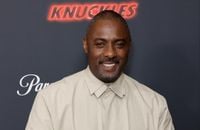Idris Elba, the British actor renowned for his breakout role as Russell "Stringer" Bell in HBO's critically acclaimed series The Wire, recently opened up about his complex feelings surrounding his character's death scene. Speaking candidly on Amy Poehler's podcast Good Hang, Elba revealed that despite his iconic portrayal, he has never watched the series and has no plans to do so.
Elba's admission may surprise many fans, considering The Wire is widely hailed as one of the greatest television dramas ever produced. The series, created by former crime journalist David Simon, aired from 2002 to 2008 and offered an unflinching, documentary-style look at the drug trade and law enforcement in Baltimore. Stringer Bell, Elba's character, was a calculated drug kingpin with ambitions of going legitimate, a role that cemented Elba's reputation as a leading man.
On Good Hang, Elba explained his reluctance to revisit the show. "If I’m really honest, I didn’t watch The Wire," he confessed. "It’s not that I’m not a fan of it – I was there. I made a show that was, you know, so intense and so real, so important, even though we didn’t realise it. I didn’t realise the importance of the show while making it." He added that he feels "a little bit outside of the club" of the show's fandom because he did not participate in its celebration as a viewer. Furthermore, Elba described the experience of Stringer Bell's death as deeply personal, saying, "when Stringer Bell died, there was a part of me that died with that character. It’s weird for me to go back and watch it." This emotional connection partly explains why he chooses not to rewatch the series.
Stringer Bell's death is one of the most memorable moments in The Wire. It occurred in the Season 3 finale, "Middle Ground," which aired in 2004. The character was killed by two formidable adversaries, Omar Little (played by the late Michael K. Williams) and Brother Mouzone (Michael Potts), in a cold and unceremonious scene that shocked viewers. Elba disclosed that David Simon had considered "various ways" to depict Stringer's demise, but ultimately, the chosen ending was a deliberate and powerful narrative decision.
Elba admitted to having "reservations about how Stringer was dying" when he first read the script. He recalled that the original planned death scene was even more provocative, involving Omar humiliating Stringer in a way Elba found sensational and tragic. "I was pissed," Elba said, recalling how he refused to perform a scene where Omar "whips his dick out and pisses on" Stringer. He felt such a portrayal was gratuitous and undermined the character's dignity.
Despite his initial objections, Elba now acknowledges that the death scene was an "important move" that made a significant political point. He explained, "Stringer and Colvin [a police officer played by Robert Wisdom] are both from different sides trying to reform the drug war, and it’s un-reformable. It belongs to the gangsters and to the career cops who want to get paid, and so Colvin and Stringer needed to have the same arc, thematically, to make the political point." This thematic arc underscores The Wire's reputation for blending gritty realism with profound social commentary.
Interestingly, the real-life inspiration for Stringer Bell did not meet the same violent end. Elba revealed that the actual person on whom Stringer was based is still alive and successfully transitioned into legitimate business ventures. "Stringer is a real person who is still alive," Elba said. "And ‘Stringer’ went on to become a very successful businessman who will remain anonymous forever but successfully built a lot of businesses and, you know, crawled out of the hole." However, Elba noted that such a peaceful exit would not have made for compelling drama within the context of the show.
David Simon, the series creator, has spoken about Elba's reaction to the character's death. Simon recalled that Elba "was not happy" when he learned Stringer would be killed off, especially as audiences were beginning to recognize him as a leading man. Simon reassured Elba, saying, "You’re going to have movie roles. You’re going to be an A-lister. People are going to get a load of this death; they’re going to acquire this story arc in retrospect — this is your calling card, man. You’re going to do fine." Indeed, Elba's career flourished after The Wire, with notable roles in films such as Thor, The Suicide Squad, and the BBC drama Luther.
Elba appeared on Amy Poehler's podcast to promote his new Amazon action comedy Heads of State, co-starring John Cena. Even though he has never watched The Wire, he expressed respect for the series' impact and the role it played in his career. All five seasons of The Wire remain available for streaming on Max, continuing to attract new viewers and maintain its legacy as a landmark television series.
Reflecting on the significance of Stringer Bell's death, Elba said, "The actual beheading of Stringer was an important move, you know? Just to illustrate to the world that, ‘Hey, man, take the blinkers off.’" This statement captures the essence of The Wire — a show unafraid to confront harsh realities and challenge its audience to see beyond surface narratives.
In the end, Stringer Bell's death remains a defining moment in television history, emblematic of The Wire's blend of brutal realism and tragic storytelling. Elba's nuanced perspective offers fans a rare glimpse into the complexities behind bringing such a character to life and the lasting impact it had on the actor himself.





